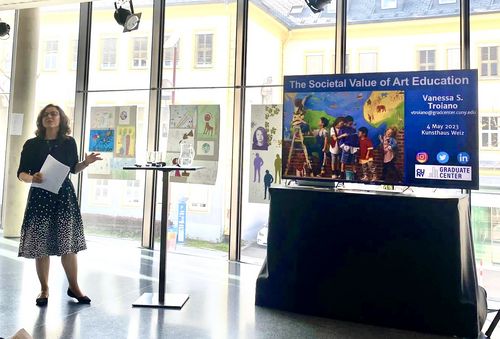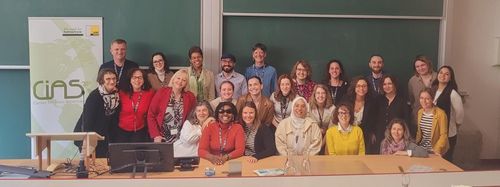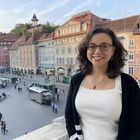In May 2023, I had the privilege to join educators at two international symposia in Styria to advocate for radical approaches to art and storytelling pedagogies. Fellow Fulbright Austria alums Roberta Maierhofer and Nicole Haring invited me to deliver the keynote speech for “Art Goes Weiz” at the Kunsthaus Weiz, a celebratory congress organized in conjunction with their academic conference, “Mediating Social Challenges: Art, Storytelling & Teaching Practices,” at the University of Graz. Both events featured the innovative research in education conducted by the University of Graz’s Center for Inter-American Studies in collaboration with the DigLit Eramus+ project and KinderKunstHochschule Steiermark. “Art Goes Weiz” also highlighted Styria’s initiatives to expand art education by exhibiting work from children studying art at the Kunstschule Weiz.
Fulbright Austria alums lead international educator symposia in Styria
27 June 20232008–09 USTA Vanessa S. Troiano writes about her recent collaboration with two other Fulbright Austria alums in the Austrian city of Weiz.
By Vanessa S. Troiano
As I expressed in my keynote speech, “The Societal Value of Art Education,” studying art has the potential to better our world, particularly when we approach it in ways that foster creativity, critical thinking, collaboration, and communication. Art education is uniquely suited to encourage praxis-oriented critical learning and citizenship. In the process of making and reflecting on art, students cultivate self-knowledge, visual literacy, and problem-solving skills through hands-on experimentation with artistic methods. Perhaps most importantly, art education empowers students by liberating their imaginations and giving them agency in their learning process. Societies invest in the innovation and sustainability of their future when they nurture the creativity of children through progressive art programs, like those being developed by the KinderKunstHochschule Steiermark.
 Vanessa presenting her keynote speech, “The Societal Value of Art Education”
© Nicole Haring
Vanessa presenting her keynote speech, “The Societal Value of Art Education”
© Nicole HaringThe multi-day conference, “Mediating Social Challenges: Art, Storytelling & Teaching Practices,” brought together educators from across the disciplines and the Atlantic to share ideas and experiences with practices that promote student engagement through art, storytelling, and digital media. I participated in the panel “Combating Inequalities in the Classroom” with my presentation, “Fostering Cultural Diversity and Critical Thinking through Socially Conscious Art History Pedagogy.” My contribution reflected on the inclusive learning methodologies I have developed over the last decade with my colleagues at the City University of New York (CUNY)—the largest urban public university in the United States—to enhance the Art History survey, a core undergraduate curriculum course. I have found that open educational resources (OER) and collaborative writing projects, especially those focused on art created from marginalized subject positions, make the discipline more engaging, accessible, and relevant to CUNY’s diverse student body while cultivating valuable community ties.
 Participants at the conference pose for a photo.
Participants at the conference pose for a photo.Teaching in Austria as a USTA in 2008–09 laid a strong foundation for my work as an arts educator, and I strive to continue to promote cultural diversity by creating learning environments that facilitate the exchange of ideas. I was honored to return to Austria this year to contribute to these international forums in education that seek to address real-world challenges through the practical application of humanities knowledge. Many thanks to Roberta Maierhofer and Nicole Haring for inviting me and to Fulbright Austria for organizing the 2022 alum gathering in New York City that initiated our transnational collaboration. I am also grateful to Theres Hinterleitner, director of KinderKunstHochschule Steiermark, and to the city of Weiz for their generous hospitality.
Vanessa is an educator and PhD candidate in art history at The Graduate Center, City University of New York (CUNY). She has taught international graduate students at Sotheby’s Institute of Art and undergraduates at CUNY’s Brooklyn and Queensborough campuses. She also curates Baruch College’s annual lecture series, A Tour of the World in Six Artworks. Vanessa’s current research engages in feminist approaches to revisionist art history. Her work has appeared in the book series Routledge Research in Art History as well as on the Smarthistory website and the Art History Teaching Resources platform.

